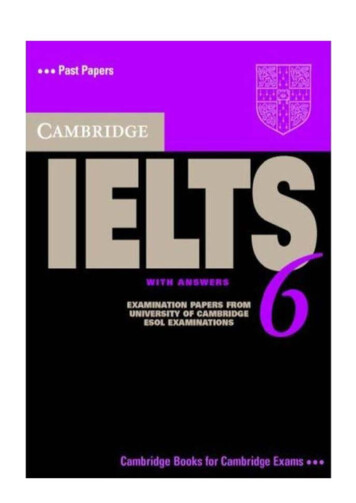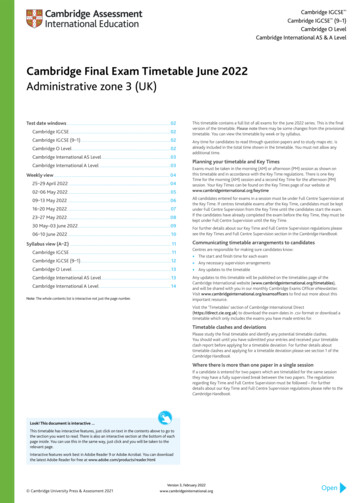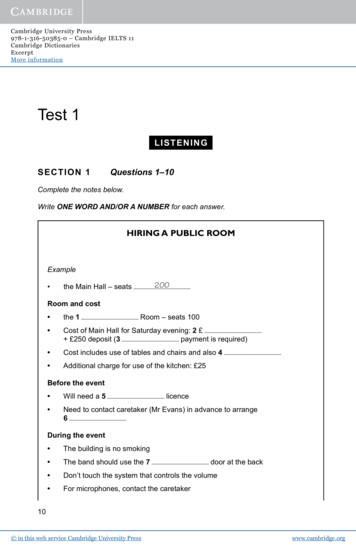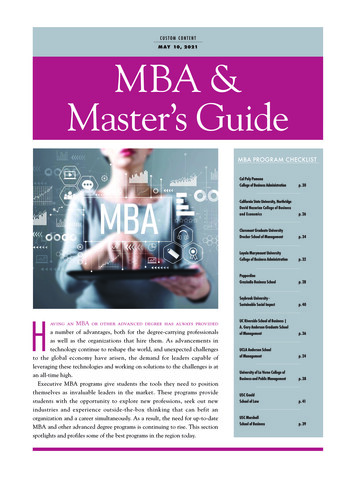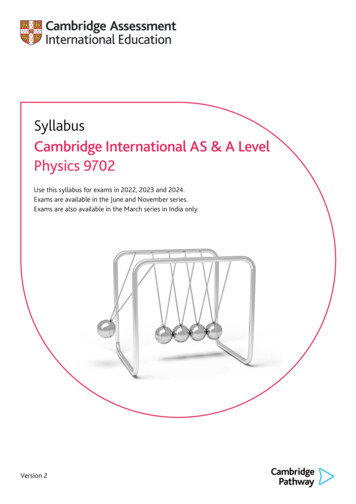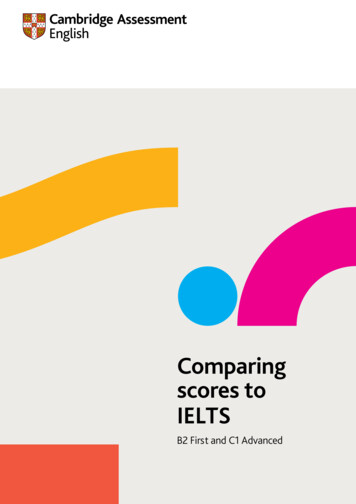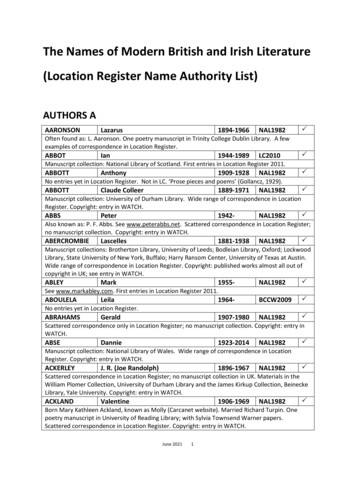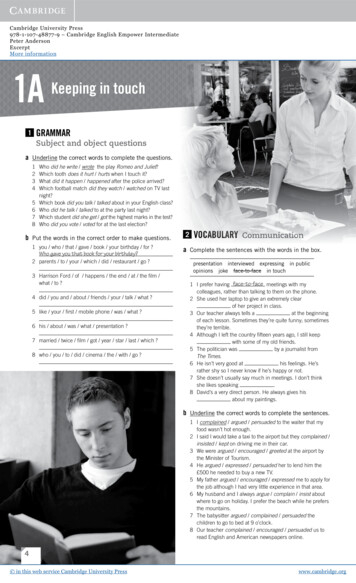
Transcription
Cambridge University Press978-1-107-48877-9 – Cambridge English Empower IntermediatePeter AndersonExcerptMore information1AKeeping in touchGRAMMAR1Subject and object questionsa Underline the correct words to complete the questions.12345678Who did he write / wrote the play Romeo and Juliet?Which tooth does it hurt / hurts when I touch it?What did it happen / happened after the police arrived?Which football match did they watch / watched on TV lastnight?Which book did you talk / talked about in your English class?Who did he talk / talked to at the party last night?Which student did she get / got the highest marks in the test?Who did you vote / voted for at the last election?b Put the words in the correct order to make questions.1 you / who / that / gave / book / your birthday / for ?Who gave you that book for your birthday?2 parents / to / your / which / did / restaurant / go ?3 Harrison Ford / of / happens / the end / at / the film /what / to ?4 did / you and / about / friends / your / talk / what ?5 like / your / first / mobile phone / was / what ?6 his / about / was / what / presentation ?7 married / twice / film / got / year / star / last / which ?8 who / you / to / did / cinema / the / with / go ?2VOCABULARY Communicationa Complete the sentences with the words in the box.presentation interviewed expressing in publicopinions joke face-to-face in touch1 I prefer having face-to-face meetings with mycolleagues, rather than talking to them on the phone.2 She used her laptop to give an extremely clearof her project in class.3 Our teacher always tells aat the beginningof each lesson. Sometimes they’re quite funny; sometimesthey’re terrible.4 Although I left the country fifteen years ago, I still keepwith some of my old friends.5 The politician wasby a journalist fromThe Times.6 He isn’t very good athis feelings. He’srather shy so I never know if he’s happy or not.7 She doesn’t usually say much in meetings. I don’t thinkshe likes speaking.8 David’s a very direct person. He always gives hisabout my paintings.b Underline the correct words to complete the sentences.1 I complained / argued / persuaded to the waiter that myfood wasn’t hot enough.2 I said I would take a taxi to the airport but they complained /insisted / kept on driving me in their car.3 We were argued / encouraged / greeted at the airport bythe Minister of Tourism.4 He argued / expressed / persuaded her to lend him the 500 he needed to buy a new TV.5 My father argued / encouraged / expressed me to apply forthe job although I had very little experience in that area.6 My husband and I always argue / complain / insist aboutwhere to go on holiday. I prefer the beach while he prefersthe mountains.7 The babysitter argued / complained / persuaded thechildren to go to bed at 9 o’clock.8 Our teacher complained / encouraged / persuaded us toread English and American newspapers online.4 in this web service Cambridge University Presswww.cambridge.org
Cambridge University Press978-1-107-48877-9 – Cambridge English Empower IntermediatePeter AndersonExcerptMore information1BI’m using an app for learning EnglishGRAMMAR1Present simpleand continuousGradable and extreme adjectivesa Match 1–8 with a–h to make sentences.a Match 1–8 with a–h12to make sentencesand questions.1 g They play2345678abcdefgh34He’s thinkingShe’s goingI’m havingHe thinksWe goI haveThey’re playing5678a yoga class on Monday evenings.to school on Saturday mornings in my country.tennis in the park. Why don’t you go and join them?about all the things he needs to do before his holiday.my dinner now so can I call you back in ten minutes?that his children will live until they are 100 years old.chess with their grandad every Sunday after lunch.to work by bike at the moment because she wants to get fit.b Complete the conversation with the present simple orpresent continuous form of the verbs in brackets.Use contractions where possible.ARTHUR 1Is Emma doing (Emma, do) well at school thesePATARTHURdays?Yes, she is.2brother?PATYes, she 3Spanish.ARTHUR Really? 4interpreter?PATShe 5(she, study) languages, like her(learn) French and(she, want) to become an(not, know) yet. She(be) only 14, after all.Yes, that’s true. And what about sport?7(she, play) a lot of sport at school?Yes, she 8(love) all sports. She9(be) particularly good atbasketball. In fact, she 10(play)for the school team in a match today.Really? Great!Hold on er, my phone 11(ring) Who is it?It’s my husband. Sorry, I must go – he12(wait) for me in the car.OK, bcdefghf I hate swimming in the North Sea becauseI thought the book was brilliant, probably the bestdetective storyAfter we’d walked 25 kmThey gave him such an enormous portion of spaghettithatLots of tourists had just left their rubbish behind them soI asked her to open the window becauseIf you’re late for his class againWe all thought the play was awful soI felt absolutely exhausted.the beach was absolutely filthy.even he couldn’t finish it.it was boiling in there.I’ve ever read.the water’s always freezing.we left the theatre at the interval.he’ll be furious!b Complete the sentences with the words in the box.tiny impossible fantastic deliciousmiserable freezing useless filthy1 We had a fantastic holiday in Bali. The weatherwas lovely, the hotel was perfect and the beaches werebeautiful.2 The weather waswhen I was in Moscowlast week – minus 15 during the day!3 He’s renting aflat in the centre of Paris –it’s only got one room!4 The children looked sowhen their petrabbit died.5 He spoke so quickly it wasto understandwhat he was saying.6 Nobody had cleaned the kitchen for months. It wasabsolutely.7 Thanks for a lovely dinner. The seafood risotto wasabsolutely. You must give me the recipe.8 My football team are completely. We lostour last match 6 – 0.5 in this web service Cambridge University Presswww.cambridge.org
Cambridge University Press978-1-107-48877-9 – Cambridge English Empower IntermediatePeter AndersonExcerptMore information1C1Everyday EnglishWell, if you ask me USEFUL LANGUAGE2Giving and responding to opinionsa Complete the exchanges with the words in the box.guesssureseeconcernedmeanopinionask thinkaskme, Tanya Davies would be the best1 A Well, if youperson for the job.B Actually, I don’t agree. As far as I’m, Luke Adamswould be better.2 A Well, Iyou could take the shoes back to the shop.B I’m not soabout that. I’ve already worn them.3 A Iit’s going to be difficult to make enough money tosurvive.B Yes, Iwhere you’re coming from. Maybe we shouldfind a cheaper office?4 A Well, in my, Italian is easier than French.B I know what you. I think it’s easier to pronounce.b1.1PRONUNCIATIONWord groupsa1.3 Listen to the exchanges and underlinethe word you hear before each speaker pauses.1 A Guess what, Tony? I’ve just read about thisgirl, and she’s only ten but she’s fluent inseveral different languages.B That’s fantastic. I can only speak onelanguage – English.2 A Hi, Linda. Are you learning Russian?B I’m trying to! But this book’s useless! Itteaches you how to say ‘my uncle’s blacktrousers’ but not how to say ‘hello’!Listen and check.c Underline the correct words to complete the sentences.1 A It comes / means / seems to me that their coffee is better than ours.B Yes, I know exactly what you mean / opinion / think. It’s reallysmooth, isn’t it?2 A As far as I’m concerned / I guess / my opinion, I think it makes senseto take the train to Paris.B I’m not so mean / right / sure about that. It takes nearly three hours.3 A I mean / sure / think Germany will probably win the football World Cup.B Yes, I think that’s mean / right / sure. They’ve got the best team.4 A Well, in my ask / guess / opinion, we need to find another businesspartner in Spain.B Yes, I see what / where / why you’re coming from. Maybe a companybased in Madrid this time?d1.2Listen and check.6 in this web service Cambridge University Presswww.cambridge.org
Cambridge University Press978-1-107-48877-9 – Cambridge English Empower IntermediatePeter AndersonExcerptMore information1DSkills for WritingDifferent ways of learningRead article1READINGEditHow to take better photos1,843,076 viewsa Read the text and tick ( ) the best ending for the sentence.If you want to be a good photographer, ayou shouldn’t take lots of photos.byou shouldn’t use your smartphone.cyou don’t need to study the manual.dyou should always take your camera with you when you go out.b Read the text again. Are the sentences true or false?1 With a digital camera or smartphone it is easier to take good photosthan 20 years ago.2 You shouldn’t use automatic mode when you start using a newcamera.3 It is better not to take many photos when you are learning how touse a camera.4 Your family and friends will be more relaxed if you take lots of photos.5 It is easy to take good photos of people using the flash on yourcamera.2WRITING SKILLS Introducing a purpose;Referring pronounsa Underline the correct words to complete the sentences.1 For improving / Improving / To improve your listening skills,it’s a good idea to watch films in English.2 You should write a sentence that includes the new wordin order / to / so that you can remember it more easily.3 It’s better to use a monolingual dictionary. These / This /Those will help you to start thinking in English.4 Some people prefer to write the new words on cards withthe translation. That / These / This technique will help youto remember what the word means and how it is spelt.5 There are lots of things you can do in order / so / that tobecome a better language learner.6 Why don’t you practise repeating the questions that you hearon the DVD-ROM so / that / to you learn the correct intonation?3CommentEdited 5 days agoThese days it is much easier to become a goodphotographer because of the big improvements incamera technology over the past 20 years. In orderto take good photos you need to have a good digitalcamera or a smartphone with a good camera.Make sure you read the manual carefully beforeyou start using your camera. This will help you tounderstand the most important functions, suchas how to use the flash and the zoom. Putting thecamera in automatic mode is a good way to makesure you don’t make too many mistakes while youare still unfamiliar with how your camera works.It is a good idea to take your camera with you at alltimes so that you are always ready to take a photowhenever you see something interesting. Try totake as many photos as possible. This will help youto get better at using your camera and will resultin better photos. Remember the saying ‘Practicemakes perfect’. The more you practise takingphotos, the better you will become.If you take lots of photos of your family and friends,in the end they will forget about the camera and feelmore relaxed when you take photos of them. Thiswill help you to take photos that look more naturaland less posed.To get the best photos of people you need to beoutdoors, as the light outside is much better. It isextremely difficult to take attractive photos of peopleindoors using flash, so it is always better to beoutside when you photograph people.WRITINGa Read the notes. Write a guide on how to be a better cook.Notes for ‘How to improve your cookery skills’1) Introduction: How to become a good cook Try new dishes. Practise. Don’t repeat same dishes all the time.2) Learn new dishes Buy recipe books. Test on family/close friends first. Larger groups later. Try new recipes 2–3 times a week. Ask family/friends for honest opinions. Make improvements.3) Watch TV cookery programmes Easy way to follow recipe. Watch & download recipes from website.4) Share recipes Enjoyed a good meal? Ask for recipe. Will discover new dishes & improve. in this web service Cambridge University Press7www.cambridge.org
Cambridge University Press978-1-107-48877-9 – Cambridge English Empower IntermediatePeter AndersonExcerptMore informationUNIT 1Reading and listening extensionREADING1a Read part of an introduction to a textbook forstudents. Are the sentences true or false?The writer of this textbook believes that 1 teachers in many countries expect their students to speakperfect English.2 her book is for students who want to improve their Englishin a short time.3 phrases that seem to be similar can sometimescommunicate opposite meanings.4 students may sound rude in English if they do not learn tospeak the language perfectly.5 we can understand someone more easily when we thinkabout the culture that they come from.b Read the text again. Match the words in bold in 1–7with the things they refer to in a–g.1 e By this, they mean that 234567abcdefgc Write a short email to the students in your classabout learning English. Your email should: introduce yourself (your name, where you come from)explain why you are learning Englishdescribe where you have learned English in the pastsay what you hope to learn on this course.Use the phrases below to help you.Hi! My name’s and I’m from I’m learning English because I want to . / need to /am going to I have been learning English for [AMOUNT OF TIME] /since [POINT IN TIME]I started learning English at school / when I was [AGE]On this course, I really want to improve my that might seem strange someone gives them a present.Why did you get me this?Why is this?And in fact, this phrase (or something like it) different cultures say them in different ways A birthday present.Ideas which are similar to each other.People from English-speaking countries.Saying Oh, you didn’t need to get me anything!Speaking English perfectly.Why did you get me this?Why one phrase is rude but the other one is polite.A Beginner’s Guide toINTERCULTURAL COMMUNICATIONA personal goal for many students is tobe able to speak English perfectly. Bythis, they mean that they would like tobe able to tell a joke or feel completelyconfident in a face-to-face conversationwith a group of native speakers. Anystudent can achieve this goal (andmany do) but it takes many, many yearsof study.If just the thought of all those years ofstudy makes you feel exhausted, then thebook you are now holding in your handsmay be for you. A Beginner’s Guide toIntercultural Communication has beenwritten to help students who are learningEnglish answer the question ‘What arethe best ways to communicate in aforeign language?’But first of all let’s think about what communication actually means.In our first language, we know that we have to choose our words verycarefully. For example, I’m from Australia so when someone gives mea birthday present, I might say:Oh, you didn’t need to get me anything!If you are not a native English speaker, that might seem strange. Butmany English speakers feel it is polite to say this when someone givesthem a present. However, the same speakers would find it quite rudeto say:Why did you get me this?Why is this? After all, the meaning of both phrases is quite similar. Andin fact, this phrase (or something like it) is quite common in a numberof European languages. The answer is simple – whether somethingseems to be rude or polite depends on culture. To communicatesuccessfully in a foreign language, we need to remember thatpeople are usually trying to say the same things but we also need toremember that different cultures say them in different ways – and thatis what intercultural communication is all about.8 in this web service Cambridge University Presswww.cambridge.org
Cambridge University Press978-1-107-48877-9 – Cambridge English Empower IntermediatePeter AndersonExcerptMore informationReview and extensionGRAMMAR1Correct the sentences.1 What time started the football match?What time did the football match start?234562aLISTENINGListen to a conversation between Bridget andJoe and tick ( ) the correct answers.1.41 What is the main topic of their conversation?athe subject Bridget studies at universityba holiday that Bridget has hadca website that Bridget is creating2 Bridget is feeling very tired because she has abeen writing something in a foreign language.bhad a lot of essays to write for university.cjust returned from a holiday in Mexico.3 Bridget wants Joe to help her to acheck her grammar and spelling.bdesign a website.cimprove her Spanish.4 Bridget shows Joe a photo of a place in aEgypt.bMexico.cSingapore.b Listen again. Underline the correct words to completethe sentences.1 Bridget has just started / almost finished / stopped workingon her website.2 At her university, Bridget is a student in the French andSpanish / Latin American studies / Culture and Politicsdepartment.3 Bridget’s website is for students at her own universityand also for students all around the world / in Colombia /in Mexico.4 A professor / Another student / Nobody else has helpedBridget to write the information she needs for her website.5 Chichen Itza is the name of a building / a city / a universitythey can see in her photo.6 Joe thinks the photo of Chichen Itza is absolutely perfect /the wrong size / too old-fashioned for Bridget’s website.c Write a conversation between two people planninga website for your English class. Think about thesequestions: what information students need (e.g. homework,vocabulary) how the information will be organised who will create the website.My brother isn’t liking coffee.How was your holiday in Spain like?Look at Tom – he wears his new shoes.Who did take you to the station?Can you repeat that? I’m not understanding.VOCABULARY2Correct the sentences.1 You’ve just walked 20 kilometres – you must be exausted.You’ve just walked 20 kilometres – you must be exhausted.2 When we were young my brother and I used to discuss all thetime, but now we’ve become good friends.3 It’s imposible to sleep because my neighbours are having aparty.4 I haven’t rested in touch with many of my old school friends.5 That cake was delicius but there was only a tiny piece left!6 My dad is very funny. He loves making jokes about his time inthe army.3WORDPOWER yourselfComplete the sentences with the verbs in the box.enjoyhelphurt doteachlook after1 Hello, Grandma. I’m sorry you fell over while you werehurtyourself.shopping. It’s lucky you didn’t2yourself to a hot drink. There’s some freshcoffee and tea in the kitchen.3 Have a great time at the party!yourself.4 You don’t need to go to classes to learn a foreign language.You canyourself using books and a DVD.5 Make sure youyourself while I’m away. Eatplenty of food and get enough sleep.6 You don’t need to pay someone to paint your bedroom. Itisn’t hard. You canit yourself.REVIEW YOUR PROGRESSLook again at Review your progress on p.18p.96 of the Student’sBook. How well can you do these things now?3 very well2 well1 not so wellI CAN talk about differentfuture possibilitiesforms of communicationdescribe experiencesactions and feelingsin the presentmakeandgivetelephonerespondcallsto opinionswrite a guide.personal profile.9 in this web service Cambridge University Presswww.cambridge.org
Notes for 'How to improve your cookery skills' 1) Introduction: How to become a good cook Try new dishes. Practise. Don't repeat same dishes all the time. 2) Learn new dishes Buy recipe books. Test on family/close friends fi rst. Larger groups later. Try new recipes 2-3 times a week. Ask family/friends for honest .
